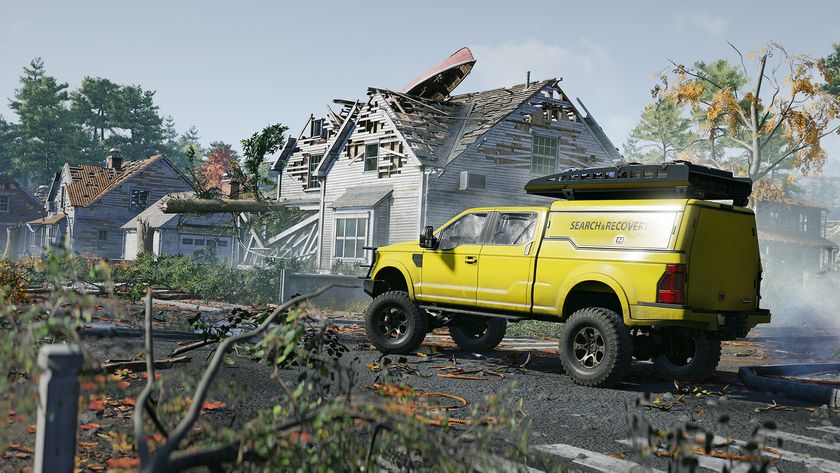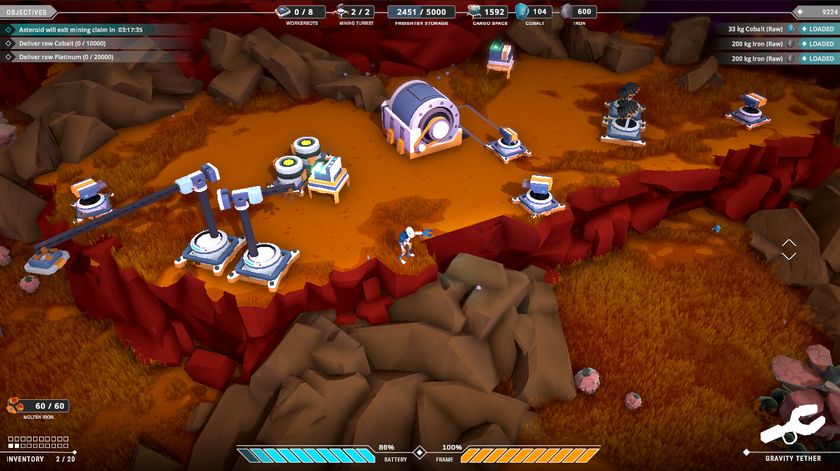Inside the hardcore fanbase keeping the Star Citizen dream alive
We spent CitizenCon with the game’s most dedicated backers to find out why they still believe.
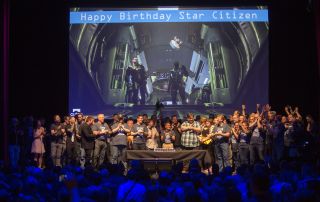
The Star Citizen faithful have spilled into the streets. It’s a brisk, neon Friday night in Santa Monica, and The Arsenal—a bougie watering hole lit solely by the blazing primary colors of ESPN shows—can barely hold the men and women talking about comm-links, spaceships, scanning animations, and Alpha 2.6. You have not lived until you have watched eager youths tenderly step into a club, order a vodka soda, and slowly realize that for one night only, those without theoretical interstellar asteroid mining organizations are not invited.
These get-togethers are colloquially known as "Bar Citizens." The Star Citizen community hosts them all the time, all over the world. It’s an easy way for the now 1.5 million backers to meet and be merry with each other across the void. Tonight’s event, however, has been officially organized by Cloud Imperium Games, and a number of developers are dotted around the floorspace, yukking it up with the fans. We’re only two days away from CitizenCon—an annual presentation of the most scrutinized unreleased game in industry history.
When you’ve traveled thousands of miles to drink at a bar in fantasy-corporate unity, you don’t need anything momentous to stay optimistic.
If you’re unfamiliar with Star Citizen’s trajectory, here are the basics. It is currently the most successful crowdfunded game of all time, having raised a massive initial pledge of $6.2 million on Kickstarter back in 2012. In the years since, Cloud Imperium Games has supplemented development costs by selling in-game spacecraft for real money. Most of these are priced in the $100 range, but a few notable exceptions can cost up to $2,500. This has naturally earned the project a number of high-profile doubters, but there are many that still believe. CitizenCon is essentially a celebration for the most ardent stalwarts. It’s taken place each year since 2013, and attracts committed fans from all over the world. They are here to be together, far from the negativity and frustrations of the nonbelievers.
I am here to take the pulse of Star Citizen's most fervent fans, who've had their passion and patience tested more than once in 2016. Most recently, a seven month investigation by Kotaku UK laid out in detail issues with the game engine, mismanagement, and layoffs that have culminated in missed deadlines and stalled progress. CitizenCon is the chance for CIG to deliver some good news.

I’m standing outside on the corner with Tortilla The Hun, Moneyshot, and Takon—three longstanding members of Test Squadron, which proudly claims to be "the most inept, drunk organization in the ‘verse of Star Citizen." They come from Vermont, Seattle, and St. Louis, and this is the first time they’ve met in real life. Our conversation unfolds in the way all Star Citizen interviews do. Moneyshot wants to check that I won’t be "flaming the game," Takon tells me how he first invested last July with a $125 freelancer package when he had some disposable income, and life is good. When you’ve traveled thousands of miles to drink at a bar in fantasy-corporate unity, you don’t need anything momentous to stay optimistic.
The emperor has arrived and is willing to enter by the front door.
And then it happens.
A jet-black BMW creeps up the curb behind us. "That’s... that’s Chris Roberts." Sure enough, the founder, director, and public face of Star Citizen is making an appearance, and the crowd are very much going wild. Videogame designers are not supposed to be immediately recognized by their silhouette, but Roberts is a bonafide superstar here.
The biggest gaming news, reviews and hardware deals
Keep up to date with the most important stories and the best deals, as picked by the PC Gamer team.
Things deteriorate quickly. The emperor has arrived and is willing to enter by the front door. Tortilla, now blissed out and punch-drunk, starts wandering towards the car. His friends grab his shoulder, pulling him back into reality. "Nobody look, dude! Nobody look!" someone shouts. "We’re not worthy! We’re not worthy!" Takon does his absolute best to focus on the now entirely inconsequential question I asked about Squadron 42, Star Citizen's planned singleplayer campaign, while the rest of the posse form a welcoming party. "I think we may have to stop this," he says, joining the ranks.
Roberts is dapper, fresh-faced, and happy to shake every hand between him and the bar. Over the past five years, he’s shepherded in $125 million from people around the world who want to make Star Citizen a reality. The dream is to build on the groundwork Roberts established with his lauded Wing Commander series, and take those ideas into the stratosphere. We will never be Han Solo. Elon Musk will not save us. But Cloud Imperium Games, in its pulpy, highly referential way, is trying to build your next best option.
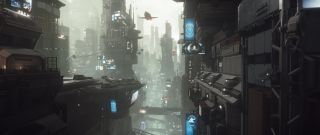
Promising the moon

Chris Roberts has been making PC games since the 1980s, when he started working on RPGs at Richard Garriott's Origin Systems. He made his name with the Wing Commander series and directed the cutting-edge FMV scenes for Wing Commander III. That eventually led him to the movie business, where he directed the 1999 film adaptation of Wing Commander. He spent the 2000s as a movie producer before returning to gaming with Star Citizen.
"I had this vision with Freelancer and it never got finished because I left and sold the company to Microsoft," Roberts told us when he first showed PC Gamer a prototype of Star Citizen in 2012. Four years later, he's still working towards that goal.
When it’s released in full, Star Citizen will include space combat, dynamically generated planets, open player-to-player trade, an impressive voice cast, and mechanics for practically every sci-fi hero/antihero narrative you can imagine. Want to be a rebellious, vulturing pirate lingering on the outskirts of the galaxy? Want to hunt those same scum and villainy for bounties? Either way, Star Citizen has you covered. There are people out there who’ve wanted an experience like this from the moment they first understood the potential of videogames. If you’re one of them, you’d be fawning over Roberts, too.
Right now, there are sliced off portions of the full Star Citizen experience already in the hands of backers. There is a fully-FPS "mini-universe" module, which lets you take off from space stations and complete missions. There’s Arena Commander, a PvE and PvP dogfighting sim, a racing module, as well as a "hangar" which lets you to examine your purchased ships in all their stationery glory. Obviously these elements are slim pickings compared to Star Citizen’s long-term goal, but each hopes to offer a small but concrete proof of concept.
The big question hanging over Star Citizen, though, is whether these disparate pieces will ever coalesce into a coherent whole. Can Robert’s grand vision truly be realized? Outside the hardcore community, extreme skepticism has set in when it comes to Star Citizen, and development takes place against a backdrop of criticism. Microtransactions were already controversial, but when you jack up the price and reduce the reward to an IOU pasted on a jpeg of a mining vessel, the result is inevitably a public image problem. CIG’s justification is that Star Citizen fans are happy to commit money to development regardless of any kickback, but as the years go by with little sign of a finished game, it’s easy to understand how the doubters continue to find their fuel.
But here, on the sidewalk, none of that matters. These men and women have already accepted Chris Roberts’ promises. Why stop now?

The $125 million dream
A few days before CitizenCon, a Spanish fan named Carlos "Lannar" Garrido delivered a manifesto on the Star Citizen subreddit. This followed an interview with Chris Roberts on a website called Gear Patrol, where he said his only worry was losing the support of the community. Lannar explained at length exactly why that was never going to happen in a twice-gilded post called "Letter to the Chairman."
"We are aware of the difficulties, and no one would be as naive as to think the road is exempt of problems. We believe in you and your team. We know you to be honest. We have seen your dedication to the game, don't think we don't notice the amount of hours you pour into the game each day," he wrote. "We are here for the feelings, for the amazing community and for being part of one of the milestones of the videogame industry history. And we get to play a game too. We are here as long time as you are. No naysayer is capable of changing that, because your work and your team's speaks loudly."
As a community we have effectively paid to keep the publisher away.
Redditor Thethomas
"It's a bit cheesy even for this subreddit's standards," Lannar admits when I contact him, "but people seemed to like it. I just wanted to have my opinion expressed. It's uncommon to find this kind of communication in a videogame in heavy development, where you can reach out for the CEOs and have them read your feedback."
The difficulties Lannar referred to include a number of reports, like Kotaku's, detailing troubles within CIG. The community, as always, largely responded with faith. Videogame development is treacherous—projects are cancelled, cut, and refocused all the time—but Star Citizen answers directly to a group of people who are fully invested in the vision. There’s this belief that by self-funding the project, the community is skirting conventional industry standards such as release dates and DLC plans. It’s difficult to imagine EA or Activision risking a loss-leading, knowingly over-scoped project for half a decade with no end in sight, but frankly, that’s kind of the point.
"Publishers force developers to take the easy route, or the cheap route, or compromise their vision in order to meet a release date," wrote Thethomas in a Reddit post called "Don’t Be The Publisher." "Publishers are the problem. I gave Cloud Imperium money specifically to keep publishers out of this process. I gave them money to put feature rich, revolutionary gameplay before target dates and 0-day patches. As a community we have effectively paid to keep the publisher away."
And to be fair, there have been recent causes for optimism. At Gamescom this year, Cloud Imperium showed off a demo for the upcoming 3.0 Star Citizen alpha build. We watched as a faceless pilot climbed into his cockpit and selected a barren planet from a vast, 3D star chart. We hit hyperspace, and suddenly a distant waypoint became a huge, untethered landmass. The spaceship broke through the atmosphere, the landing gear locked in, and our little spaceman plopped his feet on solid ground. The presentation hall went nuts. Here was a demonstration that there was something real stashed behind the curtain. One small step for a digital spaceman, one giant leap for Citizen-kind.
Ben Rathbun, who runs the YouTube channel Rawcritics, started to get emotional during his reaction video to the 3.0 demo. "The guys and I are going to be playing this forever," he says, with a wide-open grin and his dog on his lap. "We’re the type of gamers that just want a couple go-to games in our lives, and we haven’t had those steady relationships in our lives in a long time. Star Wars: Galaxies was in my life for years. World of Warcraft has been in my friend’s life for eight years. And this has taken so long, but... look at it! Look at this!"
"What overcame me as I was watching the descent," Rathbun said in a later interview, "was the realization that it wasn't about graphics or even the money they were tossing at this game. It was more about the awe I felt and the indescribable freedom and looseness that the gameplay seemed to be presenting. It became very clear to me in an instant that CIG was pulling out all the stops for this game, and building this for us from the ground up. What game developer does this? Indie devs don't have the resources and triple-A teams are too worried about bottom lines. Gamers have been so frustrated with this, which is why this realization hit me so hard as I was watching."
Rathbun tells me that if Star Citizen meets his expectations, he expects to be far too busy ignoring real life to worry about whatever happens next. "This is it, the one we’ve been waiting for right?" he says. But he also understands that nothing is guaranteed, and there’s a chance he won’t quite find a home in what Cloud Imperium is building. If that happens, he’ll pick himself back up and find a new hope to obsess over. But he doesn’t have much time for anyone rooting for failure.

In late 2015 PC Gamer spoke with a fan named Chris, aka Ozy311, who's spent more than $30,000 on Star Citizen pre-orders so far. He's pictured above with Chris Roberts.
"I spent 10 years of my gaming life in World of Warcraft. And I met amazing friends in that game, so I really truly think that this game is more of a community and social aspect than it is just a game," he told us. "So if I think about, 'I’ve helped create a project that I think is going to be game changing for the next decade,' I’m OK with that. I know that I’m going to spend more."
Chris also talked about his passion for space, which led him to build an observatory for astrophotography on his father's ranch in Arizona.
"Doesn't everyone want Star Citizen to be great? Even if you don't like certain people, respect what is trying to be accomplished here," says Rathbun. "This is a new approach in the industry, so I'm not sure if the change is scaring folks or if they just don't like space games. For a lot of people this is at the very least a positive step in the right direction for games and how they should be made. If nothing else, I mean, did they not see the alpha 3.0 demo like I did? Did their jaw not drop at the possibilities? C'mon!"
The average Star Citizen fan is more self-aware than their reputation might suggest, but they still carry resentment towards the game's critics. If you look at the comments about the Kotaku report on the subreddit, you’ll find some surprisingly nuanced discussion.
"I thought it was an excellent article. I thought it covered the issues and the timeline very well. I’m an original Kickstarter backer," reads the highest-rated reply by user Eloquent_Cantalope. Of course you can also find fanboyism if you look for it, but that’s not necessarily the norm.
But it’s undeniable that Star Citizen backers have grown defensive towards those who point out the cracks. Indie developer Derek Smart has constantly waged war on the project through his blog and Twitter account, claiming with certainty that the entire project is a scam. If we're being blunt, there are absolutely people who want the game to fail. To me, it seems like those doubts are rooted in cynicism or self-preservation. There's a pessimistic pleasure to be had from dismissing something so aspirational out of hand. And we've all been disappointed by games that promised far less than what Chris Roberts is selling. I'd rather be pleasantly surprised than left devastated by an idea I was all-in on.
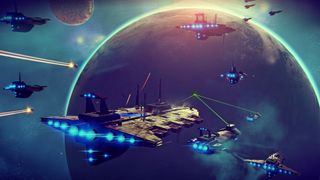
The obvious recent comparison is No Man’s Sky. The subreddit for the other procedurally generated space game is an upturned car. Sean Murray—lead designer and over-proposer—has not tweeted since August. "I do not care anymore. At all. Update your game, don't update your game. I don't care!" writes user ChingChangChui. "Any game that you work on from here on out, I will not buy out of sheer principle. You are a terrible dev; mostly because you will not communicate."
I feel like I’m expressing the sentiment of a lot of people in the community when I say this is about buying back our hobby.
Star Citizen fan Peter Brunton
There is a belief within the community that Star Citizen will avoid the disappointments of No Man’s Sky because of the unique nature of its development cycle. And to a certain extent, they’re probably right. A game like Star Citizen will never happen again. It’s a perfect confluence of player fantasy and the crowd-funding explosion. To many of the backers, the project is more pure and free than the average triple-A game, as evidenced by this thread called "finally appreciating what Chris Roberts means with PC games needing more development/support after reading all the reviews about No Man's Sky."
"Sure, there's always been a lot of hype surrounding Star Citizen, and it is an incredibly ambitious game; but the fact that we're a part of the development process and we're given the opportunity to play each new iteration and give feedback means there's no way for this game to completely fail to live up to hype/people's expectations," writes user leadofstate.
Whether or not that will actually save them from disappointment remains to be seen, but this community has little interest in hedged bets. They saw something they’ve wanted their whole lives, and they did everything they could to make it work. There’s a big difference between getting scammed and taking a leap of faith.
"We threw money at this thing hand over fist, ultimately, because Chris Roberts promised to do something batshit insane," says Peter Brunton, who posts on the Star Citizen subreddit as Voroxpete. "There’s this general feeling that this isn’t about just buying a videogame. I’m going to be a little grandiose here, but I feel like I’m expressing the sentiment of a lot of people in the community when I say this is about buying back our hobby. If I was characterizing the core Star Citizen backers, especially in the early days when the game had nothing to show for itself, there is the feeling that this was reclaiming gaming. People are sick to fucking death of Activision declaring that Call of Duty is a yearly franchise... I’m sitting here playing Destiny which is just a broken fucking mess that Bungie threw together, and it’s still one of the most imaginative games on the market. They shot for the moon, they tried something big and bold, and they missed, but they still ended with a more interesting, and original game than anything else. That’s what we wanted."
On the next page: into the heart of the community at CitizenCon 2016.


Luke Winkie is a freelance journalist and contributor to many publications, including PC Gamer, The New York Times, Gawker, Slate, and Mel Magazine. In between bouts of writing about Hearthstone, World of Warcraft and Twitch culture here on PC Gamer, Luke also publishes the newsletter On Posting. As a self-described "chronic poster," Luke has "spent hours deep-scrolling through surreptitious Likes tabs to uncover the root of intra-publication beef and broken down quote-tweet animosity like it’s Super Bowl tape." When he graduated from journalism school, he had no idea how bad it was going to get.
Most Popular





